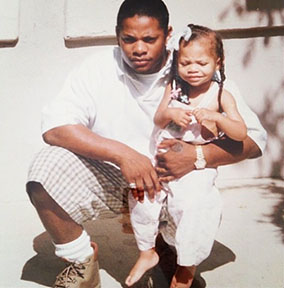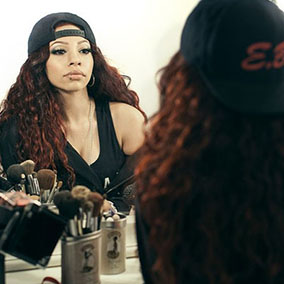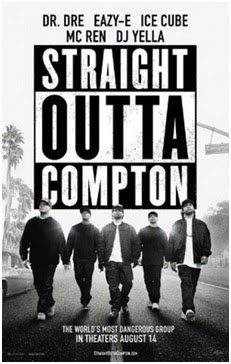Dad-E
September 8, 2015 by Las Vegas Black Image Magazine
Filed under Feature
A hip-hop legend’s life story surprises at the box office, as his daughter searches for deeper truths.
BY KIMBERLY BAILEY-TUREAUD
In packed movie houses around the country, “Straight Outta Compton” is giving millions an inside look at the birth of West Coast gangsta rap.
The young men who formed N.W.A. did so when America was grappling with race in the post-civil rights era: Violent (but un-videotaped) encounters with police were common, neighborhoods had tense relations with law enforcement, cities trembled on the verge of civil unrest.
In other words, some would say, not much different than today. Those parallels are meaningful to Erin Bria Wright, whose late father, Eric “Eazy-E” Wright, is at the center of that real-life tale about a seminal moment in hip-hop history.
“If he was here today, I think my dad would still be a voice for fighting against the violence against young black men,” she said. “Some celebrities use their influence and talk about it, but some really don’t. I think he and N.W.A. would be producing ‘F— The Police Part II” today. I really do. N.W.A and Eazy-E were a voice for the people. ”
She explained further: “The movie shows N.W.A. encountering police brutality, and racism, and all the things that were happening 20 years ago. It is sad that it is still happening now — but the difference is that we have social media now and can see it all. Police could hide back then, because there was no social media or [smartphones]. Now, we all have a bigger voice and we can all speak on it. I would like more people to stand up and fight to stop all violence. Black lives matter, all lives matter. Not all police are bad, but if my dad was here, he would never shut up about it. He talked about it back then, and would be more of a voice for it now.”
Indeed, if Eric Wright was alive now, he would see a daughter speaking out against injustice and blossoming into a pop culture figure in her own right. Erin Wright’s “We Want EB” brand is making waves with a line of stylish Tshirts and the snap-back baseball caps that her dad helped to popularize.
She is also a filmmaker, co-producing a forthcoming documentary about her father, who died of AIDS complications in 1995. It is tentatively titled “A Ruthless Scandal: No More Lies.” So did the Hollywood version of her dad’s life stray too far from the truth?
“As it relates to how my dad really died, I won’t comment and will let my documentary speak to that,” she teased. “But overall, ‘Straight Outta Compton’ was an incredible film. It was powerful, and exciting, for the world to get to know who Eazy-E was, and learn the history of N.W.A. I hope what people take away is a deeper understanding of what N.W.A did to open doors for rap artists of today.”
As for actor Jason Mitchell, who portrays her father in the biopic, Wright has nothing but praise. “My father died when I was four years of age, but from all the accounts that I know of him, and what I personally remember, Jason’s portrayal was really phenomenal,” she said. “I have heard stories about him my entire life — and everything I have imagined, I saw play out on the movie screen. Jason did a great job. I don’t think they could have cast anyone better. I am really excited for Jason and his career.” One misconception that might be advanced by the movie’s complicated narrative: the truth about Erin’s mother. Of the women in the late rap superstar’s life, only his widow, Tomica Wright, is prominently depicted in the cinematic version.
“Tomica was not my mother. Tracy Jernagin is my mother, and she was the one with my dad all throughout N.W.A.,” she said. “My father has nine children, and the oldest grew up in Compton and I grew up in Calabasas, Calif. The story got a little tricky, and his accomplishments outside of N.W.A weren’t featured because the film’s producers really didn’t consult the family for my dad’s storyline. But overall I am in support of the movie. Dr. Dre and the director, F. Gary Gray, did a really good job.”
She is pleased, in particular, to see her father’s personal side shown onscreen. “I lived with my dad up until his passing. And as a four-year-old little girl, you don’t really remember too much — but I do remember the fatherly things,” she said. “Things like when he would come home, holding me, and being very playful. A lot of people don’t realize that he was very silly, and the producers showed a lot of that in the film. Many people only think of my dad as a gangsta, but they didn’t know that he was very loving. I also remember always being with him in his office at Ruthless Records. I didn’t know, until I was nine, the impact he had on the world.”








